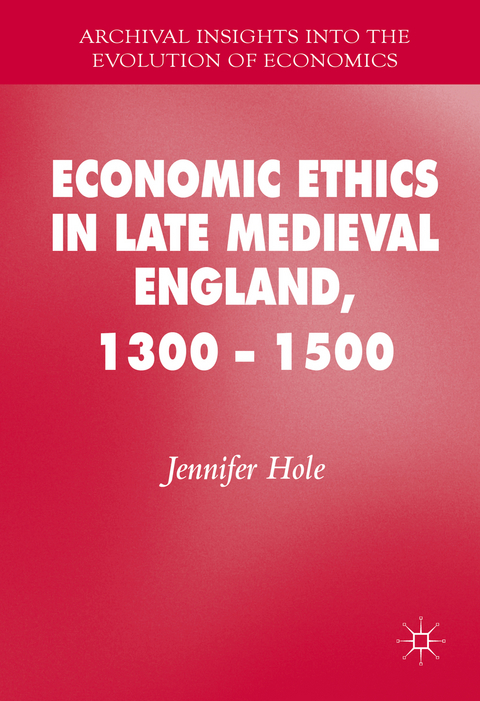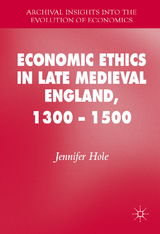Economic Ethics in Late Medieval England, 1300–1500
Springer International Publishing (Verlag)
978-3-319-38859-5 (ISBN)
Drawing on an array of archival evidence from court records to the poems of Chaucer, this work explores how medieval thinkers understood economic activity, how their ideas were transmitted and the extent to which they were accepted. Moving beyond the impersonal operations of an economy to its ethical dimension, Hole's socio-cultural study considers not only the ideas and beliefs of theologians and philosophers, but how these influenced assumptions and preoccupations about material concerns in late medieval English society. Beginning with late medieval English writings on economic ethics and its origins, the author illuminates a society which, although strictly hierarchical and unequal, nevertheless fostered expectations that all its members should avoid greed and excess consumption. Throughout, Hole aims to show that economic ethics had a broader application than trade and usury in late medieval England.
Jennifer Hole is currently Honorary Research Fellow in the Department of History at the University of Western Australia. Her previous background was in commerce, specialising in industry analysis.
Introduction.- Chapter 1. Economic Ethics.- Chapter 2. The Translation of Economic Ethics into the Daily Practices of the Laity.- Chapter 3. Wealth and Lordship in Late Medieval Literature.- Chapter 4. The Application of Theory: The Language of Economic Ethics in Statutes and Petitions.- Chapter 5. Lords of the Manor: Rapacious or Reasonable?.- Chapter 6. Merchants and Landowners' Responses to Economic Ethics.- Conclusion.
"Hole's study is ambitious, with chapters on the origins and doctrines of economic ethics, the translation of these ideas into the life of the laity, economic ethics in great literary works of the period, economic law (including case studies of economic injustice), the ethical and unethical actions of landowners, and the understanding of economic ethics among individuals as gleaned from their personal correspondence. ... This is a fine contribution to the history of economic thought." (Journal of Markets & Morality, Vol. 20 (2), 2017)
“Hole’s study is ambitious, with chapters on the origins and doctrines of economic ethics, the translation of these ideas into the life of the laity, economic ethics in great literary works of the period, economic law (including case studies of economic injustice), the ethical and unethical actions of landowners, and the understanding of economic ethics among individuals as gleaned from their personal correspondence. … This is a fine contribution to the history of economic thought.” (Journal of Markets & Morality, Vol. 20 (2), 2017)
| Erscheinungsdatum | 11.10.2016 |
|---|---|
| Reihe/Serie | Archival Insights into the Evolution of Economics |
| Zusatzinfo | XII, 300 p. |
| Verlagsort | Cham |
| Sprache | englisch |
| Maße | 148 x 210 mm |
| Themenwelt | Geschichte ► Teilgebiete der Geschichte ► Wirtschaftsgeschichte |
| Sozialwissenschaften ► Politik / Verwaltung ► Staat / Verwaltung | |
| Wirtschaft ► Volkswirtschaftslehre | |
| Schlagworte | Archival insights • Economic History • Economic phenomena and relationships • Economics and finance • Economic transactions • History of Economic Thought • Medieval England • Methodology/History of Economic Thought • public administration |
| ISBN-10 | 3-319-38859-2 / 3319388592 |
| ISBN-13 | 978-3-319-38859-5 / 9783319388595 |
| Zustand | Neuware |
| Haben Sie eine Frage zum Produkt? |
aus dem Bereich




